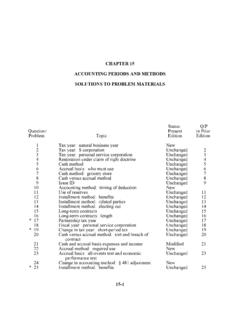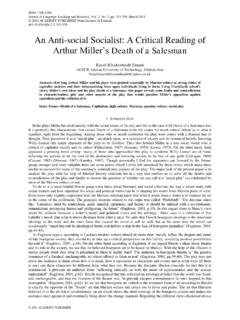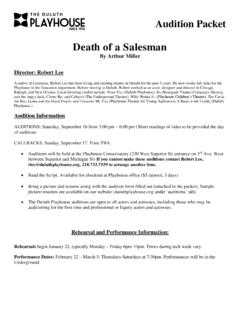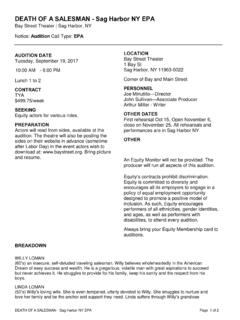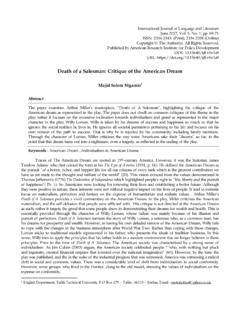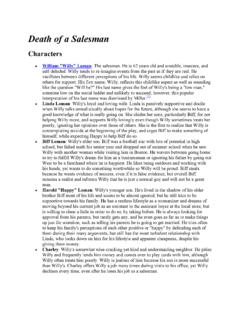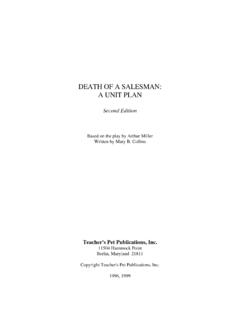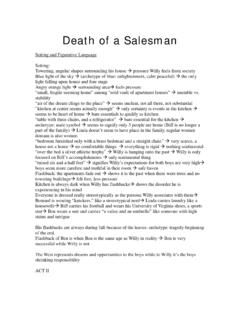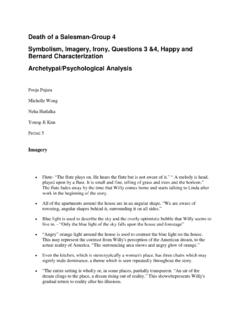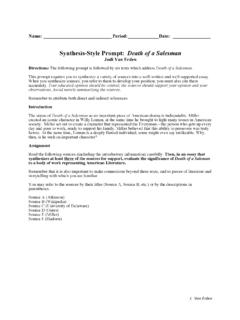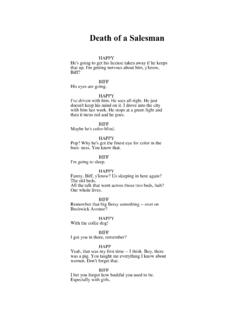Transcription of “Death of a Traveling Salesman” - Indiana State …
1 death of a Traveling salesman Eudora Welty ( 1909- )The daughter of a successful insurance executive in Jackson, Mississippi, EudoraWelty witnessed the growing tension between New South boosterism and thosevalues associated with an older society. After graduating from the University ofWisconsin and completing a three-year stint with the New Deal s Works ProgressAdministration in Mississippi, she began producing fiction in 1936. In stories like death of a Traveling salesman (1941), in her first collection, Welty writes of theloneliness of modern life, suggesting some of the human costs related to South-erners growing attachment to modernity. She was awarded the 1973 PulitzerPrize for the novel The Optimist's Bowman, who for fourteen years had traveled for a shoe companythrough Mississippi, drove his Ford along a rutted dirt path. It was along day! The time did not seem to clear the noon hurdle and settle intosoft afternoon.
2 The sun, keeping its strength here even in winter, stayedat the top of the sky, and every time Bowman stuck his head out of thedusty car to stare up the road, it seemed to reach a long arm down andpush against the top of his head, right through his hat-like the practicaljoke of an old drummer, long on the road. It made him feel all the moreangry and helpless. He was feverish, and he was not quite sure of the was his first day back on the road after a long siege of had had very high fever, and dreams, and had become weakened andpale, enough to tell the difference in the mirror, and he could not thinkclearly.. All afternoon, in the midst of his anger, and for no reason, hehad thought of his dead grandmother. She had been a comfortable more Bowman wished he could fall into the big feather bed that hadbeen in her room.. Then he forgot her desolate hill country! And he seemed to be going the wrong way-it was as if he were going back, far back.
3 There was not a house insight .. There was no use wishing he were back in bed, though. By pay-ing the hotel doctor his bill he had proved his recovery. He had not evenbeen sorry when the pretty trained nurse said good-bye. He did not likeillness, he distrusted it, as he distrusted the road without signposts. Itangered him. He had given the nurse a really expensive bracelet, justbecause she was packing up her bag and now-what if in fourteen years on the road he had never been illbefore and never had an accident? His record was broken, and he hadeven begun almost to question it.. He had gradually put up at betterhotels, in the bigger towns, but weren t they all, eternally, stuffy in sum- mer and drafty in winter? Women? He could only remember little roomswithin little rooms, like a nest of Chinese paper boxes, and if he thoughtof one woman he saw the worn loneliness that the furniture of that roomseemed built of.
4 And he himself-he was a man who always wore ratherwide-brimmed black hats, and in the wavy hotel mirrors had looked some-thing like a bullfighter, as he paused for that inevitable instant on thelanding, walking downstairs to supper.. He leaned out of the car again,and once more the sun pushed at his had wanted to reach Beulah by dark, to go to bed and sleepoff his fatigue. As he remembered, Beulah was fifty miles away from thelast town, on a graveled road. This was only a cow trail. How had he evercome to such a place? One hand wiped the sweat from his face, and hedrove had made the Beulah trip before. But he had never seen this hill orthis petering-out path before-or that cloud, he thought shyly, looking upand then down quickly-any more than he had seen this day before. Whydid he not admit he was simply lost and had been for miles?
5 He wasnot in the habit of asking the way of strangers, and these people neverknew where the very roads they lived on went to; but then he had noteven been close enough to anyone to call out. People standing in thefields now and then, or on top of the haystacks, had been too far away,looking like leaning sticks or weeds, turning a little at the solitary rattle ofhis car across their countryside, watching the pale sobered winter dustwhere it chunked out behind like big squashes down the road. The staresof these distant people had followed him solidly like a wall, impenetrable,behind which they turned back after he had cloud floated there to one side like the bolster on his grand-mother s bed. It went over a cabin on the edge of a hill, where two barechinaberry trees clutched at the sky. He drove through a heap of dead oakleaves, his wheels stirring their weightless sides to make a silvery melan-choly whistle as the car passed through their bed.
6 No car had been alongthis way ahead of him. Then he saw that he was on the edge of a ravinethat fell away, a red erosion, and that this was indeed the road s pulled the brake. But it did not hold, though he put all his strengthinto it. The car, tipped toward the edge, rolled a little. Without doubt, itwas going over the got out quietly, as though some mischief had been done him and hehad his dignity to remember. He lifted his bag and sample case out, set307 The Oxford Book of the American Souththem down, and stood back and watched the car roll over the edge. Heheard something - not the crash he was listening for, but a slow,unuproarious crackle. Rather distastefully he went to look over, and hesaw that his car had fallen into a tangle of immense grapevines as thick ashis arm, which caught it and held it, rocked it like a grotesque child in adark cradle, and then, as he watched, concerned somehow that he was notstill inside it, released it gently to the am I?
7 He wondered with a shock. Why didn t I do something?All his anger seemed to have drifted away from him. There was the house,back on the hill. He took a bag in each hand and with almost childlikewillingness went toward it. But his breathing came with difficulty, and hehad to stop to was a shotgun house, two rooms and an open passage between, perchedon the hill. The whole cabin slanted a little under the heavy heaped-upvine that covered the roof, light and green, as though forgotten from sum-mer. A woman stood in the stopped still. Then all of a sudden his heart began to behavestrangely. Like a rocket set off, it began to leap and expand into unevenpatterns of beats which showered into his brain, and he could not in scattering and falling it made no noise. It shot up with great power,almost elation, and fell gently, like acrobats, into nets. It began to poundprofoundly, then waited irresponsibly, hitting in some sort of inwardmockery first at his ribs, then against his eyes, then under his shoulderblades, and against the roof of his mouth when he tried to say, Goodafternoon, madam.
8 But he could not hear his heart-it was as quiet asashes falling. This was rather comforting; still, it was shocking to Bowmanto feel his heart beating at in his confusion, he dropped his bags, which seemed to driftin slow bulks gracefully through the air and to cushion themselves on thegray prostrate grass near the for the woman standing there, he saw at once that she was she could not possibly hear his heart, he ignored the pounding andnow looked at her carefully, and yet in his distraction dreamily, with hismouth had been cleaning the lamp, and held it, half blackened, half clear,in front of her. He saw her with the dark passage behind her. She was abig woman with a weather-beaten but unwrinkled face; her lips were heldtightly together, and her eyes looked with a curious dulled brightness intohis. He looked at her shoes, which were like bundles. If it were summershe would be barefoot.
9 Bowman, who automatically judged a woman sage on sight, set her age at fifty. She wore a formless garment of some graycoarse material, rough-dried from a washing, from which her armsappeared pink and unexpectedly round. When she never said a word andsustained her quiet pose of holding the lamp, he was convinced of thestrength in her body. Good afternoon, madam, he stared on, whether at him or at the air around him he could nottell, but after a moment she lowered her eyes to show that she would lis-ten to whatever he had to say. I wonder if you would be interested- He tried once more. An acci-dent-my car .. Her voice emerged low and remote, like a sound across a lake. Sonnyhe ain t here. Sonny? Sonny ain t here now. Her son-a fellow able to bring my car up, he decided in blurred pointed down the hill. Mhelp. y car s in the bottom of the ditch.
10 I ll need Sonny ain t here, but he ll be here. She was becoming clearer to him and her voice stronger, and Bowmansaw that she was was hardly surprised at the deepening postponement and tedium ofhis journey. He took a breath, and heard his voice speaking over the silentblows of his heart. I was sick. I am not strong yet.. May I come in? He stooped and laid his big black hat over the handle on his bag. It wasa humble motion, almost a bow, that instantly struck him as absurd andbetraying of all his weakness. He looked up at the woman, the wind blow-ing his hair. He might have continued for a long time in this unfamiliarattitude; he had never been a patient man, but when he was sick he hadlearned to sink submissively into the pillows, to wait for his medicine. Hewaited on the she, looking at him with blue eyes, turned and held open thedoor, and after a moment Bowman, as if convinced in this action, stooderect and followed her , the darkness of the house touched him like a professional handthe doctor's The woman set the half-cleaned lamp on a table in the cen-ter of the room and pointed, also like a professional person, a guide to achair with a yellow cowhide seat.
